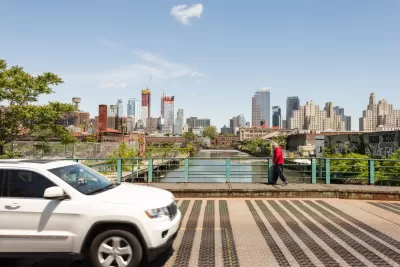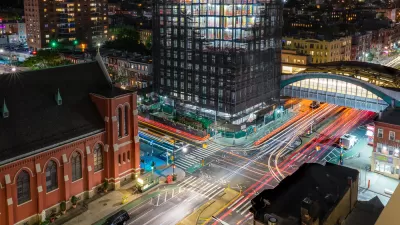As the New York City Council considers a controversial plan for the Gowanus neighborhood in Brooklyn, Moses Gates calls on the city to pass "one of the best and most inclusive community planning processes in recent times."

Moses Gates, vice president of housing and neighborhood planning at Regional Plan Association, writes an op-ed for the New York Daily News calling on the city of New York to approve the Gowanus Neighborhood Planning Study, which is waiting for a City Council decision after winning approval from the New York City Planning Commission and clearing obstacles like the pandemic and a lawsuit that targeted the plan for its socially distanced public review.
According to Gates, the ongoing controversy is the work of a "small handful of opponents…choosing lawsuits and scare tactics over engaging and providing ideas or solutions." These obstacles, according to Gates, "[threaten] to hijack one of the best and most inclusive community planning processes in recent times — one that directly addresses the long-standing environmental hazards of the neighborhood."
Doing nothing has consequences, writes Gates.
The opposite of moving forward with the Gowanus plan is not preserving the existing neighborhood in amber; it’s increasing flooding that slowly eats away at our infrastructure, letting our public housing crumble and abandoning efforts to clean up pollution. Instead of affordable housing and parks, we’ll see a combination of high-rent apartments and last-mile warehousing bringing more and more truck traffic to the neighborhood. It’s a future in which rents, which have increased by more than 20% in the last decade alone, continue to skyrocket due to the housing squeeze. It’s a future that adds nothing for either existing or new residents.
Gates argues that the Gowanus Neighborhood Planning Study would mitigate all of those trends. The Racial Equity Report for the plan foresees a net positive for racial equity, for example. Gates also explains how the plan will address stormwater and other environmental risks.
FULL STORY: It’s long past time to rezone Gowanus

Planetizen Federal Action Tracker
A weekly monitor of how Trump’s orders and actions are impacting planners and planning in America.

Restaurant Patios Were a Pandemic Win — Why Were They so Hard to Keep?
Social distancing requirements and changes in travel patterns prompted cities to pilot new uses for street and sidewalk space. Then it got complicated.

Map: Where Senate Republicans Want to Sell Your Public Lands
For public land advocates, the Senate Republicans’ proposal to sell millions of acres of public land in the West is “the biggest fight of their careers.”

Maui's Vacation Rental Debate Turns Ugly
Verbal attacks, misinformation campaigns and fistfights plague a high-stakes debate to convert thousands of vacation rentals into long-term housing.

San Francisco Suspends Traffic Calming Amidst Record Deaths
Citing “a challenging fiscal landscape,” the city will cease the program on the heels of 42 traffic deaths, including 24 pedestrians.

California Homeless Arrests, Citations Spike After Ruling
An investigation reveals that anti-homeless actions increased up to 500% after Grants Pass v. Johnson — even in cities claiming no policy change.
Urban Design for Planners 1: Software Tools
This six-course series explores essential urban design concepts using open source software and equips planners with the tools they need to participate fully in the urban design process.
Planning for Universal Design
Learn the tools for implementing Universal Design in planning regulations.
Heyer Gruel & Associates PA
JM Goldson LLC
Custer County Colorado
City of Camden Redevelopment Agency
City of Astoria
Transportation Research & Education Center (TREC) at Portland State University
Camden Redevelopment Agency
City of Claremont
Municipality of Princeton (NJ)





























